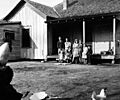Lissie, Texas facts for kids
Lissie is a small community in Wharton County, Texas, United States. It is not officially a city or town. In 2000, about 70 people lived there. Lissie is part of the larger Greater Houston area.
Quick facts for kids
Lissie, Texas
|
|
|---|---|
| Country | United States |
| State | Texas |
| County | Wharton |
| Elevation | 153 ft (47 m) |
| Time zone | UTC-6 (Central (CST)) |
| • Summer (DST) | UTC-5 (CDT) |
| ZIP code |
77454
|
| Area code(s) | 979 |
Contents
History of Lissie
Early Settlement and New Philadelphia
Even though a railway was built through the area in 1859, many settlers did not arrive until 1878. They settled near West Bernard Creek. A train station and a post office were built in 1878.
The community grew and was named New Philadelphia. It had a Methodist church, a hotel, and other businesses.
Welsh Immigration Attempt
In 1878, many Welsh miners lost their jobs in Great Britain. An organization was formed to help them move to Texas. A Texas agent in London advertised land for sale.
The offer included a house, garden, fenced grassland, cattle, farm tools, and a horse. They also promised cooking supplies and a water well. Families would get credit for food until their first crop. Most immigrants came from the Rhymney and Rhondda valleys.
However, the plan did not work well. Money from the emigration society stopped coming. Also, some immigrants arrived too late to plant crops. After less than ten years, only a few families remained.
Challenges and Changes
The area used to be open land for cattle. There were arguments because of this. In 1961, most of New Philadelphia was destroyed by a fire. Some people said the fire was started to keep away livestock thieves. The local post office closed in 1891.
Later, a company bought over 60,000 acres (24,000 ha) in Wharton and Colorado counties. They tried to get farmers from northern states to move there. The company promised good land for farming. People who bought 160 acres (65 ha) even got a free train ticket.
This plan was more successful because farmers came instead of miners. However, the soil and weather were not good for the crops they usually grew. The company's pamphlet said oranges, peaches, strawberries, and grains could grow there. But these crops did not do well in Lissie.
The Rise of Rice Farming
The future of Lissie changed with rice farming. In 1898, a man named Captain William Dunovant planted 40 acres (16 ha) of rice. It was a successful harvest.
In 1899, the Eagle Lake Rice Irrigation Corporation was started. They built a water-pumping station. Their canal reached Lissie. Rice farming helped land promoters avoid problems with unhappy customers.
The first irrigation well was drilled near Lissie in 1899. Soon, there were over 150 wells in the area. In 1903, a power station was built to run wells. Later, canals from the Colorado River provided water. Lissie became a major rice-producing area in Texas. Today, Colorado and Wharton counties are top rice producers.
Modern Lissie
For a long time, people in Lissie earned good money from rice and natural gas. But in the 1980s, prices for oil and rice dropped. This caused some farmers to change crops or lose their farms.
By 1990, Lissie's main business area was gone. Only a small garage, a rice drier, and a plant nursery were still open.
Hunters visit Lissie every winter. The area is on a path for geese and ducks. Lissie is known as the "goose-hunting capital of the world." Many rice farmers rent their land to hunters. This extra money is like a "third crop" for them.
In the early 1990s, about 75 families used the Lissie post office. The population was 100 in 1927 and 70 in 1950. In 1990 and 2000, about 70 people lived in Lissie. A cemetery is located east of State Highway 90A.
Lissie has a post office with the ZIP code 77454.
Geography
Lissie is located along U.S. Highway 90A. It is about 10 miles (16 km) west of East Bernard. It is also about 6.5 miles (10.5 km) east of Eagle Lake. Lissie is in northern Wharton County, along the Southern Pacific Railroad.
Education
Since 1956, students in Lissie have attended schools in the East Bernard Independent School District.
Gallery
 | Percy Lavon Julian |
 | Katherine Johnson |
 | George Washington Carver |
 | Annie Easley |









